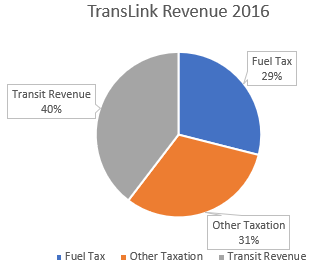TransLink currently receives revenue from a variety of sources such as through local taxation, revenue from providing transit service, and directly from government. The two largest categories are taxation and from transit service. One of the more significant taxation sources currently is fuel tax at 17 cents per litre.
The cost of fuel has been rapidly increasing. In the past, this has resulted in a drop of revenue from fuel tax, and an increase in transit use. At the same time, people are shifting to electric and other more fuel-efficient vehicles over the next decade. This got me thinking about how TransLink will be funding the new 10-Year Transit Vision.
TransLink recently updated their financial projections over the next 10 years. I have included select information in the following charts from those projections.
 |
| TransLink Projected Revenue 2017-2026. Actual Revenue in 2016. Select image to enlarge. |
 |
| TransLink Revenue 2016. Select image to enlarge. |
 |
| TransLink Projected Revenue 2020. Select image to enlarge. |
 |
| TransLink Projected Revenue 2026. Select image to enlarge. |
TransLink has accounted for the fact that fuel tax will be a smaller part of their funding mix. This is encouraging to see. TransLink’s Mayors’ Council launched the Mobility Pricing Independent Commission in part to figure out how to replace the fuel tax.
In this day and age, fuel tax is a poor way to pay for transportation systems. As more people shift to walking, cycling, transit, and more efficient vehicles, less money will be available to fund the network. I look forward to seeing fuel tax replaced.
The Details
| 2016 | 2017 | 2018 | 2019 | 2020 | 2021 | 2022 | 2023 | 2024 | 2025 | 2026 | |
|---|---|---|---|---|---|---|---|---|---|---|---|
| Fuel Tax | $396m | $388m | $388m | $389m | $390m | $390m | $391m | $391m | $392m | $392m | $393m |
| Other Taxation | $430m | $448m | $467m | $485m | $512m | $537m | $561m | $582m | $603m | $626m | $648m |
| Transit Revenue | $542m | $566m | $595m | $624m | $653m | $675m | $700m | $724m | $747m | $768m | $790m |

No comments:
Post a Comment